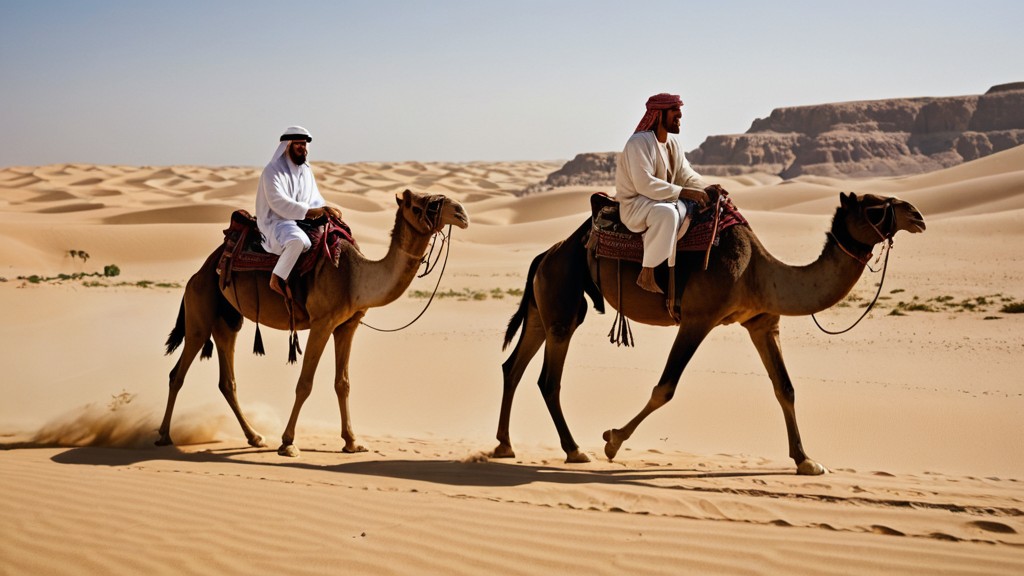The Bedouin Heritage

The Bedouin Heritage: Living Traditions of the Arabian Desert
The Bedouin Heritage The Bedouins, the desert-dwelling nomads of the Arabian Peninsula, have long been an integral part of Arabian culture and history. Their traditions, deeply rooted in survival amidst the harsh desert environment, continue to influence modern Arabian societies in myriad ways. From camel races to traditional crafts and poetry, Bedouin heritage is a vibrant tapestry of living traditions that connect the past to the present.
A Way of Life Adapted to the Desert
The Bedouins, meaning “desert dwellers” in Arabic, traditionally led a nomadic lifestyle, moving across vast stretches of desert in search of water and grazing land for their camels. The harsh environment of the Arabian Desert shaped their resourcefulness and fostered a strong sense of community.
Today, while many Bedouins have transitioned to urban living, their traditions and values remain alive. The Bedouin code of hospitality, or diwan, is a hallmark of their culture, emphasizing generosity and kindness to strangers. Guests are often treated to coffee brewed from freshly roasted beans, a ritual that symbolizes friendship and respect.
Learn more about Bedouin hospitality at Arabian Heritage.
The Bedouin Heritage Camel Racing: The Sport of the Desert
The Bedouin Heritage Camels, known as the “ships of the desert,” have been central to Bedouin life for centuries. Beyond their utility as transportation and sources of milk, camels are celebrated in Bedouin culture through the traditional sport of camel racing.
Modern camel racing has evolved into a high-tech affair, with robot jockeys replacing human riders to ensure fairness and safety. Tracks in countries like Saudi Arabia, the UAE, and Qatar host prestigious camel races, drawing participants and spectators from across the region. The annual Al Marmoom Heritage Festival in Dubai is one such event, where tradition meets innovation in a spectacular display of Bedouin pride. The Bedouin Heritage
For details about camel racing events, visit Camel Race Association.
Poetry: The Voice of the Bedouins
Poetry, or Nabati poetry, is another cornerstone of Bedouin culture. Often described as the “newspaper of the Bedouins,” this oral tradition served as a medium for storytelling, social commentary, and the expression of emotions.
Bedouin poetry is rich in imagery, drawing inspiration from the desert landscape, tribal values, and themes of love and honor. Even in modern Arabian societies, Nabati poetry continues to thrive, with competitions and festivals celebrating this art form.
One of the most famous modern initiatives is the Million’s Poet, a televised competition held in Abu Dhabi that showcases the creativity and depth of Bedouin-inspired poetry.
Discover more about Nabati poetry at Cultural Foundations.
Traditional Crafts: The Art of Survival The Bedouin Heritage
The Bedouins’ resourcefulness is evident in their traditional crafts, which were born out of necessity but have become symbols of their cultural identity.
- Weaving: Bedouin women are renowned for their weaving skills, creating intricate textiles for tents, rugs, and camel saddlebags. These items, often adorned with geometric patterns and vibrant colors, reflect the aesthetics of desert life.
- Jewelry: Silver jewelry, adorned with beads and stones, holds cultural significance and is often passed down through generations as family heirlooms.
- Leatherwork: From water bags to footwear, leathercraft was essential for survival in the desert and remains a valued Bedouin tradition.
Today, these crafts are celebrated in art galleries and cultural festivals, ensuring their preservation for future generations.
Bedouin Influence on Modern Arabian Societies The Bedouin Heritage
Despite modernization, the influence of Bedouin culture remains deeply ingrained in Arabian societies. Bedouin-inspired elements are evident in architecture, cuisine, and even contemporary fashion. The Bedouin Heritage
Events like the Janadriyah Festival in Saudi Arabia and the Global Village in Dubai offer a platform to experience Bedouin culture through exhibits, performances, and traditional food. The preservation of Bedouin heritage is not just a celebration of the past but a bridge to the future, ensuring that these traditions remain relevant in a rapidly changing world.
